How Union College students are publishing a book series on Amazon to raise their voices and affect change
This article was written by three students who took the “Millennials and Social Change “ class in the spring of 2018 at Union College, NY. It has been pulled together and edited by Christine Henseler. The essay also includes paragraphs from the Introduction of the book Generation Now: Millennials Call for Social Change.
In the spring of 2018, we, three out of 18 Union College students, took a class called “Millennials and Social Change” taught by Prof. Christine Henseler. We were in for a surprise. We had registered for a course about the rise of the everyday changemaker and by the end of the term, we had become published authors. With honesty, dedication, and fearless courage, we had written personal stories to inspire and imbue a sense of hope to others. Our collective calls for change became a book we titled Generation Now: Millennials Call for Social Change, currently available for $9.50 on Amazon (all proceeds donated). This is the story of our transformation. It’s the insider’s look at the process of publishing a book in ten weeks, the challenges and frustrations, the lasting impact, and the reasons why we decided to share our experience here.
Millennials, and their younger siblings, GenZ, are arguably the most diverse, open-minded, and apt to break the status quo. We were born and raised in an era of information and global communications, where even the smallest injustice, in the smallest town, in the smallest country, triggers a call for respect. In our day, everything is relevant and everyone deserves attention. Everyone is expected to know everything. Anything is possible, ironically making new discoveries seem impossible. Yet, how can we, Millennials, care about everything when we have an almost overwhelming amount of information at our fingertips? How can we make an impact in this world if every time we tackle one issue, another one seems to arise? Human emotion. That’s how we hoped to evoke a response in the readers of our book, to connect us all, regardless of age or experience.
In Generation Now, our personal experiences give voice to our generation, the Millennials, born roughly between 1980-2000. Our stories act as a thread that connects each generation together – a force more powerful than age. So, while we ate gummy bears and laughed as we worked (yes, our professor brought us gummy bears to class), the narratives we shared during this course explored issues that are of relevance to everyone in our world: immigration, sexual violence, education, disability, gender and sexuality, religious faith, suicide, pollution, technology, poverty, and illness. Our desire for change was driven by our diverse personal experiences, professional interests, and cultural and ethnic backgrounds.
The Awakening: Why Everyday Changemaking Changes Everything
We are a group of students from Union College in Schenectady, NY. To some, the fact that we are young may invalidate our work. How can we inspire social change at such a young age? What do we even know about social change?
Cure cancer. Eliminate poverty. Create world peace.
These are what we believed we needed to accomplish in order to claim the title of a “changemaker”. And this task appeared arduous. What we learned was that this impossible ambition was incorrect. Everyday changemaking is just as powerful and equally as important because it comes from a deeply human and honest place of meaning-making and civic purpose. One that can affect change one step at a time, over the long haul. In ways that matter to each person. To the communities in which we live.
But what is change? We referred to Merriam-Webster, looking for a simple answer. Then, when asked how we as individuals define change, we found that our answers varied:
“Ideas that move and influence a community to act differently from their norm.”
“Small actions that occur during a period of opportunity create a ripple effect, ultimately creating the powerful movements that solidify social change.”
Many of us paired “change” with words like “significant”, as if these two words together were unquestionable, like peanut butter and jelly. This element of the grandiose was almost paralyzing to us as students. What we determined was that change can be made both in intangible ways, such as by changing attitudes and behaviors, as well as in more tangible ways, like changing laws and policies. Change does not have to be groundbreaking, earth shifting, or world-building, it simply has to be put into action.
Our action was based on the production of a book created with the intention of claiming our individual voices and putting our personal stories into action. It was based on connecting across generations and communities. Continuation. Change is not stagnant. It is ever-evolving, able to awaken and inspire. That was our goal, anyway. But we got out way more than we expected from a college class.
The Book Production: You Get Out What You Put In
What separates our stories from all other books on social change that seem to spew idyllic sounding narratives?
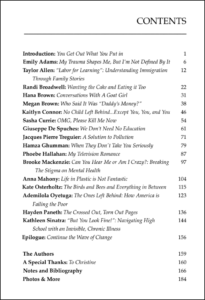 Well, for starters, we literally signed up for a course titled “Millennials and Social Change.” Every Wednesday, for ten weeks, we took a shuttle to a professional office space in downtown Schenectady, where we workshopped and collaborated. We were determined to produce the best possible product. Brilliantly guided by our professor, we learned about social change and were inspired by the case studies of already successful young adults affecting real-world change right now.
Well, for starters, we literally signed up for a course titled “Millennials and Social Change.” Every Wednesday, for ten weeks, we took a shuttle to a professional office space in downtown Schenectady, where we workshopped and collaborated. We were determined to produce the best possible product. Brilliantly guided by our professor, we learned about social change and were inspired by the case studies of already successful young adults affecting real-world change right now.
The class was very student-driven, embodying the seemingly cliché, yet abundantly accurate quote, “you get out what you put in.” We learned about the need for increasing educational opportunities through videos, Ted Talks, articles, and books like Adam Braun’s The Promise of a Pencil: How an Ordinary Person Can Create Extraordinary Change. Through the film The Clean Bin Project, directed by Grant Baldwin, we learned the importance of taking an active role in combating excessive waste. The journey documented in Living on One Dollar, directed by Chris Temple, Zach Ingrasci, and Sean Leonard, encouraged us to reflect on our own growth throughout the course by logging in our weekly journal entries. With this knowledge in hand, we were prepared to start our own process of changemaking.
Throughout the process of writing our personal narratives, each one of us went through our own writing journey. We quickly realized the colossal task we were taking on. It would not be easy and we each grappled with this challenge in our own way. For some, choosing which issue we were passionate about seemed impossible. For others, it was coping with trauma or hardship and having the courage to share that story. During this portion of the project we were reminded that our voices matter and that our generation has the capacity to ignite that change we all desperately wish to see.
This book did not come together without hurdles. We faced obstacles, large and small, every day, as we worked in teams to determine the book design, typesetting, editing, marketing, and the writing of the introduction and epilogue. In addition to learning the reward of perseverance when faced with a daunting task, we learned the value of self-motivation. We especially learned about compromise as we peer-reviewed each other’s essays, the Introduction to the book, and democratically voted on the cover design, the title of the book, even the price of the book and the organization to which we were donating all proceeds, which was an after-school tutoring program in Schenectady called C.O.C.O.A House.
Meeting once a week for three and a half hours, we had to hold ourselves accountable. If we did not put in the necessary effort, our work would not be part of the book. Failure was a tangible and often spoken possibility. We would either create a book in ten weeks, or we would lose the chance if we did not hold ourselves or our classmates to deadlines, and excellence. It was these real-world challenges that helped us learn, and without which we would have produced a very different book.
Combining 18 brains is easier said than done. It was inevitable that when communicating our different ideas, we were bound to bump heads. But it was those bumps that shaped the book and made it that much more authentic. Despite this, all of our desires were met through compromise. We learned that compromise is imperative in effectively completing a task, and likewise, in making change. Whether that be socially, governmentally, economically, or culturally, being able to listen, speak up, and have the willingness to set aside your ideas for a better one is what creates a successful changemaker, a solid and moral human being. And we were in the process of experiencing the successes and failures that come with that process of becoming.
Self Exploration: Why We Need It Now More than Ever
Parents, professors, and other adults are always talking about and trying to prepare college students for the “real world.” While we think academia should throw this term out, we believe the core of this idea is to create independent achievers with developed thinking qualities. The topics in this book span from the seriousness of educational equality to the unfettering of sexual conversations, from the despair of suicide prevention supports to the psychological impact of domestic violence. The vulnerabilities that emerged through our personal narratives demonstrate that on and off campus divides are more artificial than in the real world.
As complete human beings, we students bring our entire selves to campus, and as such, we believe in the importance of reflecting on our place in the world in more comprehensive ways. As we learned in this class, in a world in which most of our societal challenges seem to be bigger than ourselves and technology is externalizing our thoughts and actions, honest self-reflection is more important than ever.
There is no doubt that an open process of self-reflection has its limits in a classroom setting. That is why Christine took us to a downtown Schenectady office called Urban Co-Works. It is a cool, open, industrial-designed space formerly inhabited by a crowdsourced company you may remember named Quirky. By collaborating in a space where other professionals were also working, Christine was able to create a more open and equal learning environment where her role was closer to that of a facilitator and guide than a traditional professor. In this space, through constant workshopping, peer editing, and conversation, we were encouraged to bring our authentic selves to the table and to take charge of our own stories.
This course taught us lessons that still benefit us to this day. From the get-go, there was a common goal between the members of the class: to invoke real social change through the publication of our stories, but on the first day it seemed daunting to ask that of 18 strangers. Academia and emotion are often hard to connect; every course we sit in after this one reminds us of the divide between the two. How to get these emotions out of people that hardly know each other?
Through constant workshopping, reflecting, and sharing, slowly but surely our personal experiences bubbled to the surface. We began to really see each other. We shared our vulnerabilities in ways we had never done before. And through that process we made life-long meaningful connections with one another in ways no other classroom setting had accomplished. We saw that academia is its most impactful when we get to express our real emotions. We began to realize that publishing this book was more than a course, it was a life experience.
When our personal stories began to emerge through genuine engagements with one another, constant workshopping, conversation, and editing, that’s when we began to expose our deep-seated and diverse life experiences. We might be studying at a private Liberal Arts institution, but there was so much more beneath the surface. We came from black, brown, white, upper, middle and lower class backgrounds; we were American-Japanese, -Tibetan, -Haitian and -Pakistani, first generation immigrants and students living between two countries, gay and lesbian, transformed by sexual abuse or long-term health afflictions and disease, liberal and conservative, and, even royal—yes, we even had a real live Prince among us (and we dare you to read the book to figure out who it is).
The Impact: How We Still Benefit from this Class Today
You can never fully understand how much something has impacted you until you’re through to the other side. It comes and it goes but it seems for us that as soon as we forget about what our amazing project can do, it pops up somewhere and reminds us again.
This class has prepared me, Kathleen, to discuss projects and ideas important to me in a manner that is productive, informative, and (I hope) inspiring. Since this class, I have had the opportunity to present to multiple high school classes on how one can become a changemaker through storytelling and the importance of seeking out change-making opportunities. It has also inspired me to produce my own book titled A Letter to My Little Sister: Stories that Inspire the Fight for Women’s Rights. This has not only allowed me to continue to make change through the promotion of causes important to me, but helped shape and empower the current and next generation.
I, Kate, have found that this book impacted me post-class more than I could have imagined. Just as I start to forget its influence, an opportunity pops up that only the book could have brought me. When interviewing for a very competitive internship this summer the employer was so impressed by this accomplishment, he did not ask me about anything else on my resumé, but kept mentioning how the publication sets me apart from other applicants. There are so many small moments like this, whether it be in my work in the Admissions Office at Union or simply networking in my town. The course has launched me forward in ways I could not have imagined.
The “Millennials and Social Change” class had a direct impact on my, Hayden’s, effective communication and leadership skills, and helped me understand myself better. For the first time in my life I get to experience what it’s like to have a book in my name, on Amazon, for anyone to buy. The work I put in during the 10 weeks of the course lives on! And every time I mention the book to someone they are in awe and inspired. I had a job interview with a DAAD RISE University in Germany and the only thing they asked me during my interview (for a chemistry lab) was the inspiration of the book publication. This made me stand out as a candidate and I ranked the highest on the list of students they wanted to work with. Publishing a book also helped me better reflect on my work. I now know to ask myself what kind of impact I could have. Could I put in more effort to produce better work? Is my writing style inclusive and articulate, or can I push myself a bit more?
All three of us are writing this article because we want to share the impact of this educational experience with others. At 18 years old it seems impossible to make any change in our world. As you try to acclimate to life as an adult, determining how to even begin the process of making change seems daunting and can easily be pushed aside with the rationale that “we are too young, too inexperienced, and have the rest of our lives to fix the problem.” The creation of this book showed us that simply trying to make change is a step in the right direction. But, moreover, that sharing of experiences was important to giving voice to not only ourselves, but our community, peers, and generation. We have been amazed not only by the power we each hold to create change, but by how meaningful it can be when we join together to do so.
Creating Change: Not A Typical College Class
Academic settings like this course make the impossible possible. They ignite the fire under each student and remind us that we have the ability to create change. Education is now more student driven than it has ever been before and the voices of our peers influence us in ways we could never imagine. But learning, communication and collaboration across generations has become more important than ever.
The “MIllennials and Social Change” class did not help us learn what has already been discovered. It did much more than that; it encouraged the discovery to create through self exploration and the engagement and support of one another. We feel that it is essential that we continue this movement in education, that we continue to inspire our peers to share their voice and we empower our teachers to transform our educational experiences, one changemaker at a time.
A typical college class requires countless hours of memorization along with external subject familiarization. While that learning style has worked for centuries, the students that got the most out of this class spent hours finding the changemaker within ourselves by getting to know one another better. We researched issues that mattered to us, and wrote a story of change about the communities we so care about, realizing that our individual work, in our own lives, also affected those around us. It was when we stumbled upon obstacles in the creation of our social change narration that we were reminded: our voices matters.
This process of physically writing in class was the most humbling, and fulfilling experience some of us will have for a long time. We learned that we can be a force. We knew we all had a desperate and burning desire to impact the world around us. This fire became unstoppable and allowed us to be vulnerable and fearless when sharing our stories with each other, and with you.
It’s hard to tangibly explain the growth, opportunity, connection and pride we continue to feel from this project. It has changed our worldview and shows the world around us that we young people have a lot to say, and we will be heard. Individually we are strong, our stories show that, we have survived invisible illnesses, escaped alone from a Hasidic community and fearlessly immigrated to the US from Pakistan for a better life. Individually we are strong, together, we are a force.
Hayden Paneth
I am a Chemistry Major, German Minor at Union College.I wanted to write this piece because it was a defining moment during my childhood that left me feeling powerless; I wrote it with the hope that someone reading this would feel less alone in the desire to pursue an education for themselves.
Kate Osterholz
I am an Anthropology and Environmental Policy Double Major. I wanted to write this piece because I wanted to explore the power in my own vulnerability, connect with the community in a new way and learn how to use my voice as a student to empower others!
Kathleen Sinatra
I am a Political Science and Spanish & Hispanic Studies double major from Bridgewater, CT. I am interested in the combination of academic writing and personal narrative so as to create pieces that can serve as catalysts for change.
Christine Henseler
Associate Professor of Spanish at Union College. She works on topics pertaining to Generation X, twenty-first century Spanish literature, media and cultural studies, and the humanities. You can find her on Twitter.
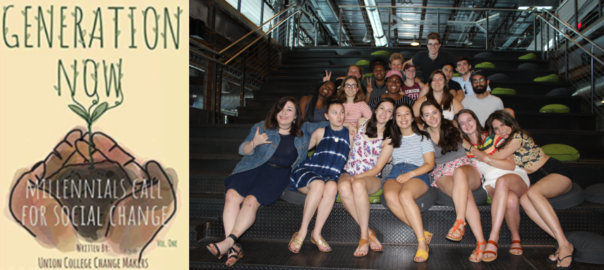
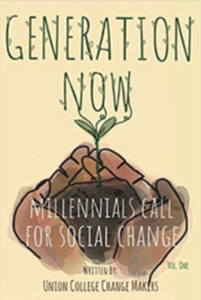
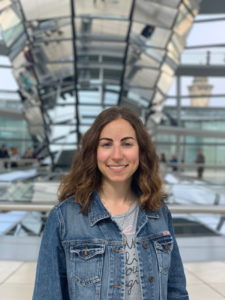
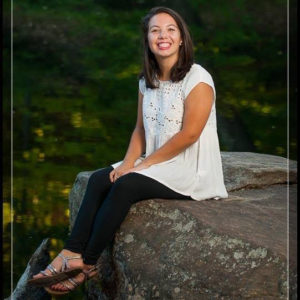
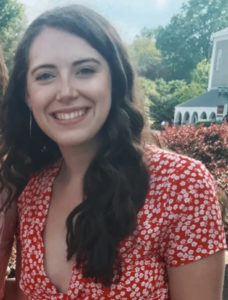
What an amazing write up? Quite inspiring. I have been driving an Association that also advocates for the Humanities in Nigerian Universities. Can we collaborate if you don’t mind?